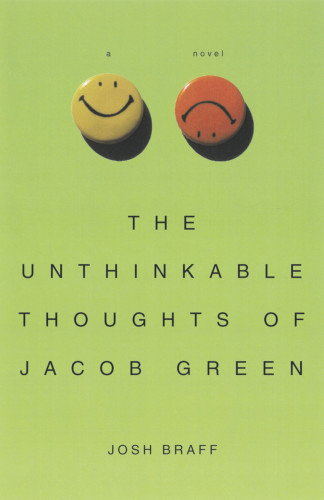
The Unthinkable Thoughts of Jacob Green
فرمت کتاب
ebook
تاریخ انتشار
2004
Lexile Score
670
Reading Level
3
ATOS
4.3
Interest Level
9-12(UG)
نویسنده
Joshua Braffناشر
Algonquin Booksشابک
9781565128934
کتاب های مرتبط
- اطلاعات
- نقد و بررسی
- دیدگاه کاربران
نقد و بررسی

August 2, 2004
A witty, sensitive boy observes the darkly humorous goings-on in his Orthodox Jewish family in 1970s New Jersey. Jacob Green idolizes his older brother, Asher, and misses his withdrawn mother, Claire, but his father, the charismatic, tyrannical Abram, dominates the family. At 10, Jacob's unthinkable sin of forgetting to wear his tzitzit to yeshiva sets off an amusing chain of events—Asher's scheming to trick the rabbi, the destruction of the rabbi's tzitzit and Jacob's suspension—that quickly turns sober when Jacob faces his father's rage. At 13, Jacob lives in a state of anxiety—his learning disability and his father's resulting disappointment erode his confidence; Asher withdraws into adolescence; his mother flees the house to pursue a Ph.D. and another man. Jacob would love to rebel (he's got "a father so far up my ass you can see him performing in my pupils"), but mostly he mentally rewrites his bar mitzvah thank-yous as rants and fantasizes about his live-in babysitter, Megan. When Claire and Abram divorce and Megan moves out, Jacob conveys his angst through a series of letters addressed to Megan. By the time he's 15, Jacob is painfully lonely, as he shuttles between his father's oppressiveness and his mother's honeymooning obliviousness. Although Jacob is a likable, funny narrator, his keen observation and vibrant imagination falter under the weight of Abram's presence and Claire's absence. Agent, Sonia Pabley.

December 1, 2004
Adult/High School-Jacob's unthinkable thoughts are typical of many adolescents, and some might even be considered unprintable. They are also extremely funny and poignant. His father, who is obsessively anxious to be seen as the head of a perfect Jewish family, is acutely conscious of his background and resents the fact that his parents didn't raise him with knowledge of his faith and heritage. He is determined to make this up in his children's education, forging ahead with this plan (and so many others) with little concern for the feelings or interests of his children or his wife, who ultimately leaves. He has already alienated the boy's older brother, Asher, and 11-year-old Jacob becomes the "good son," who "reads Hebrew so beautifully it'll make you cry." Jacob's thoughts progress from the relatively innocent desire to skip Hebrew school to the erotic when he watches television curled up with the au pair. He loves his father, understands his mother, and idolizes Asher, fantasizing that he can escape with him as he enters college, even figuring out what train to take and how to pay for it all. Yet as the novel ends, 15-year-old Jacob is still shuttling between his mother's home and his father's increasing desire for perfection in his environs. The teen's life is difficult and his relationships conflicted, but he does not whine, moving through it all doing the best he can. A funny and thought-provoking coming-of-age journey.-Susan H. Woodcock, Fairfax County Public Library, Chantilly, VA
Copyright 2004 School Library Journal, LLC Used with permission.

August 15, 2004
Braff's debut novel tells the story of a boy torn between self-discovery and loyalty to his despotic father. Abram Green is obsessed with molding his children into successful and devout young Jewish adults in suburban New Jersey. Unfortunately, Abram's son, ten-year-old Jacob, is mediocre at nearly everything he tries, which enrages his father and heightens Jacob's anxiety. As Jacob enters adolescence, he obediently participates in his father's tedious rituals as the family deteriorates: Jacob's mother leaves Abram for her college professor, while Jacob's older brother, Asher, vandalizes the local Hebrew school and engages in a heavy-metal lifestyle with other local delinquents. As Abram makes Jacob's world increasingly complicated and painful, Jacob remains unable to stand up to his father and is reduced to dreaming about escaping on a train with Asher some day. Despite Abram's behavior, one never doubts Jacob's love for his father and his hopeless desire to please him. The novel's pathos and characters develop as the tension increases, transforming it from a commonplace coming-of-age tale into a believable depiction of family strife that transcends religion. Recommended for most public libraries.--Kevin Greczek, Ewing, NJ
Copyright 2004 Library Journal, LLC Used with permission.

Starred review from July 1, 2004
Like a child, Jacob Green's father, Abram, wants what he wants when he wants it and will throw a temper tantrum if he doesn't get it. What Abram wants most of all is the perfect suburban Jewish family--perfectly intelligent, perfectly religious, and perfect at obeying thy father. Braff's rich, moving, and very funny first novel begins with a 1977 housewarming party at which Abram dramatically introduces each member of his family while the four children and their mother seethe with resentment at being paraded as testaments to Abram's greatness. Jacob's present-tense, first-person narration keeps the pace quick, and the exquisite plotting ensures that Jacob's growing emotional turmoil is paralleled by metaphorically resonant real-life events. To survive and mentally escape his father's cruel, perverse love, young Jacob shares hilariously unthinkable thoughts--the funniest are the hypothetical bar mitzvah thank-you notes in which Jacob thanks people for Jerusalem stone bookends and the like and then details his lust for his live-in nanny before signing "Love, Jacob." Readers will adore Jacob, but Braff's greater accomplishment is describing the boy's complex relationship with his father so well that we are forced to see the cruel, self-obsessed Abram as something more than a mere monster of ego.(Reprinted with permission of Booklist, copyright 2004, American Library Association.)

























دیدگاه کاربران